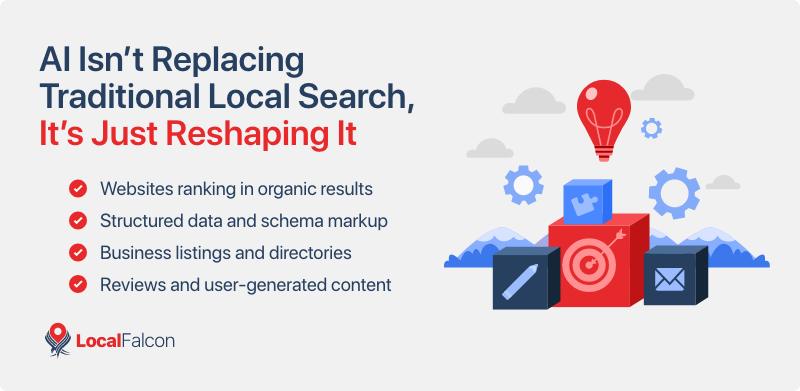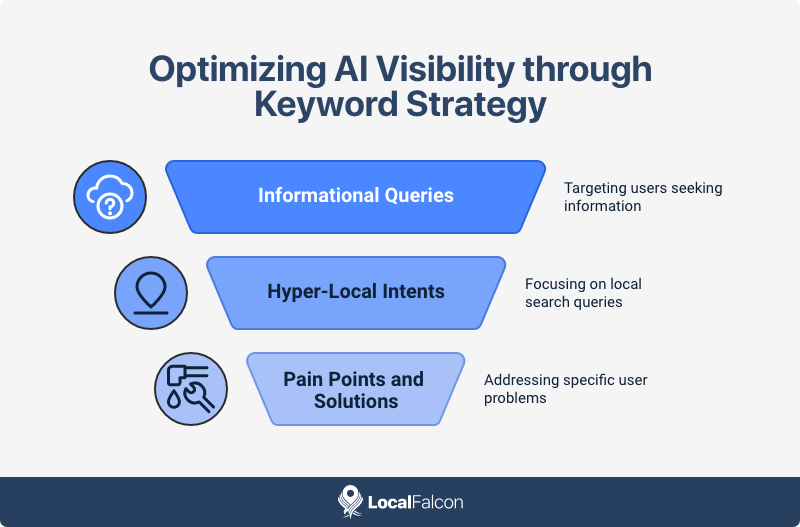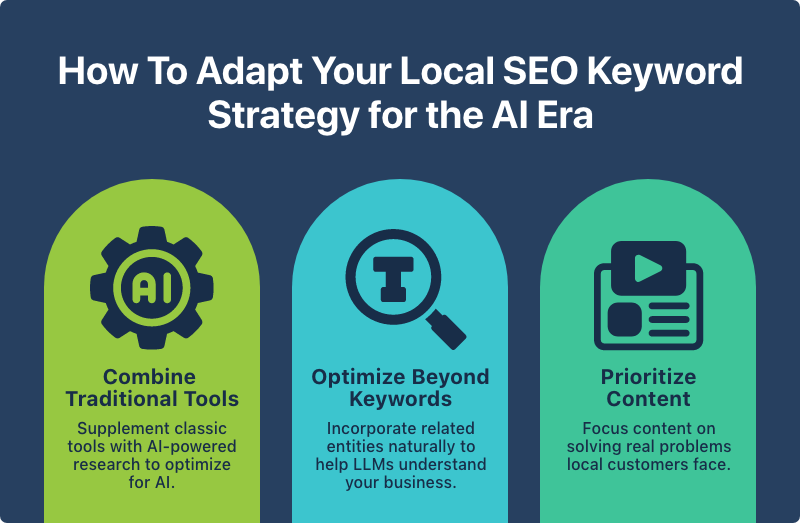Keyword research has long been at the core of search engine optimization, including local SEO. In addition to optimizing Google Business Profile, local businesses need to identify the right local search terms to target on their business sites to drive visibility in organic search.
However, as AI-powered search tools and features continue to evolve and proliferate at breakneck speed, many businesses and local marketers have been left wondering: how important is keyword research for local SEO in the AI era?
With Google's AI Overviews, ChatGPT, and other AI copilots increasingly cutting into traditional search traffic, it's natural to question the value of doing traditional local SEO keyword research. But the reality is that keyword research is still important. It's just evolving, and businesses and local SEO pros need to shift their mindsets to adapt.

AI Isn't Replacing Traditional Local Search, It's Just Reshaping It
It's easy to feel like local SEO is quickly careening entirely towards a future centered around AI-generated answers and zero-click search results. And, while it's true that more queries are being answered directly in tools like AI Overviews or ChatGPT, it's important to remember that the foundation of these answers is still rooted in traditional SEO signals, including keywords and phrases that help AI understand context and relevance. For example, AI search responses for local queries still pull data from:
- Websites ranking in organic results
- Structured data and schema markup
- Business listings and directories
- Reviews and user-generated content
If your website and business listings aren't aligned with the right keywords and topics, you're far less likely to be featured in these AI-generated answers. This is why keyword research remains relevant to AI optimization: it feeds the data ecosystem these AI-powered search tools rely on.
Why Traditional Keyword Research Alone Isn't Enough Anymore
That being said, traditional local keyword research, focusing solely on exact-match phrases like "best plumber in Seattle" or "pizza near me," is no longer enough to fully optimize for modern search.
This is because AI search tools don't just look at exact words and phrases to surface information and businesses. They analyze entities, relationships, and intent behind search queries to provide users with aggregated information. This means ranking for specific short-tail keywords in blue-link search results is just one piece of the local SEO puzzle, and it's important to expand keyword targeting beyond traditional high-volume terms if you want to get mentioned by AI.
For example, a query like "what's the best roofing material for homes in snowy climates?" may not contain the phrase "roofing contractor in Denver", but a local roofer from Denver who has created relevant, in-depth content on roofing for snowy regions could still be referenced and cited in AI Overviews or AI assistant responses, especially if Google recognizes that business as an authority on that topic.
The Shift Toward Entity-Based Keyword Optimization for AI
In the AI era, local SEO success increasingly revolves around entity optimization. An "entity" refers to a distinct, identifiable thing or concept, such as:
- Your business name
- Your service categories (plumber, Italian restaurant, family law attorney)
- Related attributes (affordable, sustainable, kid-friendly, 24/7 availability)
- Geographic identifiers (cities, towns, neighborhoods, commercial districts, local landmarks)
Google and other AI tools build entity profiles by connecting:
- Business listings (Google Business Profile, Yelp, Tripadvisor, etc.)
- Reviews mentioning specific services or attributes
- Website content, including blog posts, service/location pages, and FAQs
- Structured data (like schema markup)
As such, keyword research now needs to go beyond finding high-volume phrases and include identifying key entities and topics that describe your business and services. This can include:
- Specific services you offer
- Related industries or products
- Pain points or questions your customers frequently ask
- Locations or landmarks
In this way, you're optimizing for concepts and relationships, not just words. This helps search engines and AI tools alike build semantic networks, known as knowledge graphs, to enable better data organization, retrieval, and understanding.

Long-Tail and Intent-Based Keywords Are Critical for AI Visibility
Effective keyword research now also requires a stronger focus on long-tail, intent-driven search terms, also known as conversational keywords.
AI tools excel at answering nuanced questions and guiding users through complex queries. This means optimizing only for short, broad keywords misses a significant chunk of AI visibility opportunities.
To maximize AI visibility, your keyword strategy should focus more than ever on optimizing for:
- Informational queries: Example: "How much does it cost to replace a furnace in Toronto?"
- Hyper-local intents: Example: "Where's the best gluten-free bakery near Queen Street West Toronto?"
- Pain points and solutions: Example: "How can I fix a clogged bathroom sink without chemicals?"
Optimizing for these types of long-tail, conversational queries might not always drive massive search volumes, but it can attract highly qualified traffic, not to mention it's far more likely to help your business get surfaced in AI-driven results.
Additionally, even if appearing in AI-generated responses doesn't necessarily drive traditional performance metrics (like calls, clicks, and direction requests), it increases brand recognition, which is more important than ever in the AI era.

How To Adapt Your Local SEO Keyword Strategy for the AI Era
Below are some practical tips to modernize your local keyword research approach to help you optimize your local SEO strategy for AI-driven search.
1. Combine Traditional Tools with AI-Based Research
Continue using classic tools like Google Keyword Planner, Semrush, or Ahrefs, but supplement this with AI-powered research. After all, what could be better at helping you optimize for AI than AI itself?
For example, if you're researching keywords for a cleaning business, you might ask ChatGPT something like: "What are the most common conversational search queries people have related to house cleaning?" This approach can uncover natural language queries that customers actually use in voice searches or when interacting with AI assistants.
These types of conversational, intent-driven queries often won't show up in traditional keyword tools because they're lower volume, but they can reveal valuable opportunities to create content that aligns with how people are actually searching today.
2. Optimize Beyond Keywords
Incorporate related entities naturally in your content to help Large Language Models (LLMs) fully understand what your business is, where it operates, and what makes it unique. For example:
- Mention your city/neighborhood/service area frequently and naturally.
- Reference landmarks, events, or popular spots near your business.
- Highlight your unique selling points and specialties (e.g., eco-friendly cleaning, 24-hour service).
3. Prioritize Content That Solves Problems
Focus your content around solving real problems that local customers face. Answer questions clearly, concisely, and thoroughly, using FAQs, blog posts, and service pages. AI search tools are designed to provide helpful, actionable answers, and that's exactly what they'll reward by referencing and citing your content in AI Overviews and other AI-generated responses.
So, rather than focusing only on promotional content, prioritize creating resources that:
- Answer common customer questions clearly and thoroughly
- Address specific pain points or concerns
- Offer step-by-step solutions or advice
The Bottom Line
Keyword research is still a core component of local SEO, but in the AI era, it looks very different from the exact-match-based keyword strategies of the past.
It's no longer enough to focus solely on short, high-volume, geo-modified search phrases. To stay competitive, local businesses and SEO professionals must take a broader, more strategic approach, one that blends traditional keyword research with AI-driven insights, entity optimization, and intent-focused targeting.
Today's most successful local SEO strategies go beyond traditional keyword targeting to focus on topics, relationships, and customer intent. That means optimizing your website and content for the types of questions and problems your customers are actually asking about, including phrasing things in more natural, conversational ways to align with the way people are using AI tools to search.
The businesses that adapt to this new reality by aligning their content with AI-driven search behaviors will not only maintain their local visibility, but also build greater authority, relevance, and brand recognition in the eyes of AI and customers alike.


